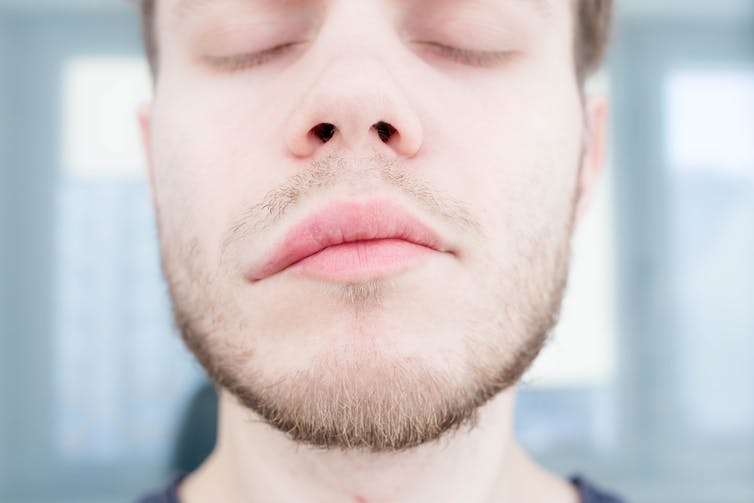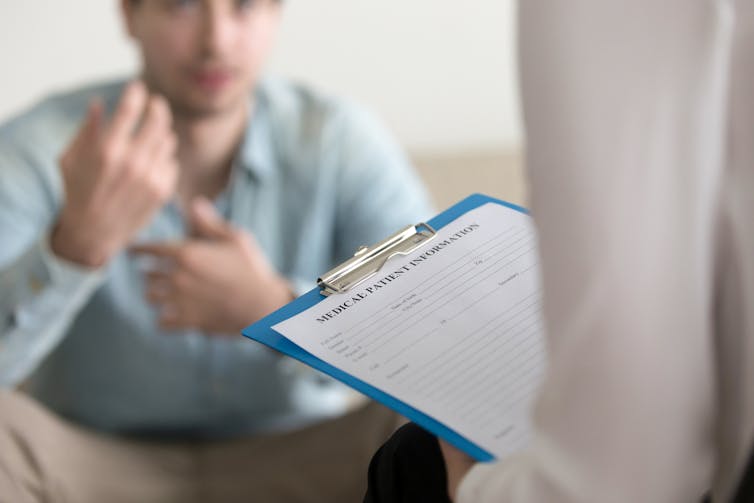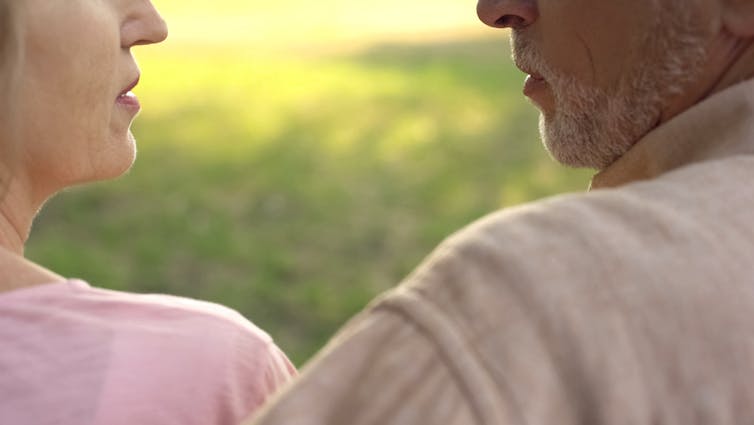In a chatty world, losing your speech can be alienating. But there's help
- Written by Kirrie J Ballard, Professor, Speech Pathology, University of Sydney
Sam is a high school drama teacher — articulate, funny, smart. It’s an ordinary day and she isn’t feeling great, but pushes through. At morning tea, she spills coffee down her shirt; at lunch she notices a strange sensation in her lips and tongue. Then her speech starts to sound odd, slurred, indistinct.
Sam is having a stroke. In the following months, her speech is still painstakingly slow, full of mistakes, hard to understand.
Read more: How to recognise a stroke and what you should know about their treatment
Sam is still funny and smart but no-one can see that. She can’t work. Her friends are impatient or embarrassed, condescending at times, and they gradually disappear.
Fortunately, help is available. But the path to recovery will test Sam’s mettle and redefine her identity.
How common are conditions like Sam’s?
Speech disorders like Sam’s can affect people at any age. But people aren’t generally aware these problems can arise as an adult.
In Australia, someone has a stroke every nine minutes. That means about 153 people have a stroke every day. Up to 70% of people who survive a stroke cannot speak clearly and intelligibly. For about a quarter of these stroke survivors, these effects persist for months to years.
 About a third of stroke survivors are under the age of 65, like this man who now has an asymmetrical face, and whose speech might be impaired.
from www.shutterstock.com
About a third of stroke survivors are under the age of 65, like this man who now has an asymmetrical face, and whose speech might be impaired.
from www.shutterstock.com
While stroke is most common in the elderly, 30% of stroke survivors are under the age of 65.
Acquired speech disorders are even more common in other conditions. About 50% of people with Parkinson’s disease, up to 50% with multiple sclerosis, and as many as 65% with a traumatic brain injury have them.
Read more: Explainer: what is traumatic brain injury?
What’s causing Sam’s difficulties?
Sam’s stroke damaged the area of the brain that controls her mouth movements, causing a motor speech disorder. There are different types. But Sam has the type called apraxia of speech. Her muscles still work fine for eating but, when it comes to speech, she can no longer control precisely where they move and when.
Read more: How to tell if your child has a speech or language impairment
Other types of motor speech disorders are called dysarthrias and can make the muscles too tense, too relaxed, or limited in their range of movement.
Motor speech disorders are different to language disorders, called aphasia. Aphasia affects your ability to find the right words and sentences to convey your ideas or to understand what others say to you. However, motor speech disorders and aphasia can occur together.
The effects can go beyond losing your speech
Sam told me, as part of yet-to-be published research, out of all the difficulties after her stroke:
[…] speech was by far the most alienating one.
If you lose your speech, you can lose your job, your social network, your independence, your identity. Some have likened it to being in a foreign country and not being able to communicate at all.
Read more: Stroke survivors and their carers often have poor mental health. Here's how we can help them
But it’s not quite the same. People with motor speech disorders often can understand everything you say. They want to respond and contribute to the conversation, but their disorder means people don’t understand what they say or they speak too slowly.
In this example, someone with a motor speech disorder, like the one Sam has, finds it difficult to say longer, more complex words. The person is saying “the municipal judge sentenced the criminal”.
If you lose your speech, what can you do?
People rarely realise learning to speak required thousands of hours of practice. By the time children turn four, they produce on average 1,900 speech vocalisations a day. These not only include words, but also phrases produced on one breath.
But you can’t remember this, so developing your speech seemed effortless. In fact, most of us take our speech for granted.
Read more: Explainer: Why the human voice is so versatile
The good news is, speech is like any other complex motor skill. It is like swimming or playing the piano, or relearning to walk after a stroke. If you use it, you can improve it.
As Sam realised:
If I work as hard as I can, there’s no way I can’t get a little better.
What type of therapist do I need?
So, what type of help is available? A good place to start is a speech pathologist.
You can find one in hospitals, rehabilitation centres and in the community. They work with you to build a program of practice and activities to improve your speech.
 A speech pathologist will work with you to build a program of activities and practice to improve your speech.
from www.shutterstock.com
A speech pathologist will work with you to build a program of activities and practice to improve your speech.
from www.shutterstock.com
While relearning to speak is not easy, we now know people respond to carefully structured therapy that stimulates activity in the undamaged parts of the brain that control movements needed for speech.
This therapy looks and feels like training programs for other complex motor skills: practising multiple times a week, at moderate intensity, using the targeted skills and behaviours in a range of activities and contexts.
For instance, a typical session might involve practising useful words or phrases (by yourself or out in the community), making sure you use all the right sounds, over-enunciating, and gradually speeding up to sound more natural.
Not everyone can access therapy
But there’s a problem. Most people can’t afford one-on-one sessions with a “trainer” or therapist for multiple practice sessions a week. And it’s uncommon for a speech pathologist to work with a patient for months at a time.
According to Speech Pathology Australia’s submission (submission 224) to a Senate committee into speech pathology services, specialist services for adults with speech disorders are “extremely limited”.
 The support of friends and family is critical in helping people on the long road to recovering their speech.
from www.shutterstock.com
The support of friends and family is critical in helping people on the long road to recovering their speech.
from www.shutterstock.com
While health-care systems and funding may support people in the early stages after a stroke or injury, the submission continues “long term help available in the community, and support for communication are severely lacking”.
This situation is perplexing given a communication disorder has a “huge impact on an individual’s productivity and participation”.
What happened to Sam?
This was Sam’s experience of working with a speech pathologist. She told me:
First you have […] contact but then it’s expensive.
Sam and her family soon realised the ball was in their court:
That’s how it all started – taking accountability for my own recovery. The most important thing for me was knowing it’s possible – instilling hope.
Sam used what she had learned in her speech therapy sessions. Combined with her intelligence, common sense, tenacity, and her family and friends, she created her own rehabilitation program.
It included a range of exercises to target specific skills, such as challenging words, speech rhythm, and fluency in conversation. She practised every day in different environments — at home, out with friends, in noisy and quiet environments. She used different supports, sometimes a notepad, other times a phone app.
Like a personal training program at the gym, she has done this every day, ever since.
It is now nine years since Sam’s stroke. She’s back working. Her speech, most of the time, doesn’t attract attention. She trips over the occasional longer word (legitimatise is one recent example) and her speech can sound a little drunken if she gets over-tired. She says, it was perhaps the greatest challenge of her life but worth the fight.
What could we do better for people like Sam?
Sam is just one example of how the current health-care model of rehabilitation services for people with long-term communication difficulties is not fit for purpose.
Sam embraced the challenge to create her own program but for many this is overwhelming.
The predominant model of therapy, heavily supervised by an expert clinician, needs to change. Instead, we need to encourage a person’s “ownership” of their own recovery, encourage people to share accountability for therapy goals and outcomes with clinicians, have programs available in the community, and support people to build a strong network of family, friends and colleagues.
A speech pathologist is a critical member of the team. But people with speech disorders will be disadvantaged until we embrace models of care like Sam’s.
Find an Australian speech pathologist near you. Paid and free resources about motor speech disorders are also available.
Authors: Kirrie J Ballard, Professor, Speech Pathology, University of Sydney



















